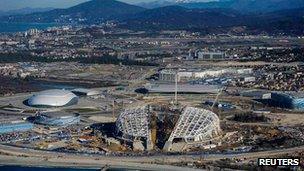Fry's Russia Winter Olympics switch call rejected by PM
- Published
Stephen Fry suggests athletes make a symbol to display their objection to the anti-gay laws
The prime minister has rejected a call from broadcaster Stephen Fry to strip Russia of the 2014 Winter Olympics because of its new anti-gay laws.
In an open letter on his website, external Fry said Russia was "making scapegoats of gay people".
David Cameron said he shared his "deep concern about the abuse of gay people in Russia", but did not back a boycott.
Fry later acknowledged the Games would go ahead in Sochi, but suggested athletes could hold symbolic protests.
A Russian law, passed in June, prescribes heavy fines for anyone providing information about homosexuality to people under 18 - but Moscow denies it is discriminatory.
Fry was among several hundred people who gathered in Westminster to demonstrate the against the law.
He was among those calling for the Games to be moved to a different country, but others at the protest were urging athletes to refuse to attend.
The Games are due to take place in the Black Sea resort of Sochi in southern Russia in February next year.
Speaking to the BBC, Fry said it was "probably not realistic to call for a move or a boycott at this stage in terms of it achieving its objective".
He added: "But I think it is realistic to call for it and to create moments like this where people think really hard."
Fry called on athletes attending and make a symbolic protest, suggesting it could be a gesture such as crossing their hands in front of their chest, which he went on to demonstrate.
He said: "It's inevitable it will happen, but I hope people will agree with me that all our athletes and all the athletes in the Games should find a symbol whether during the performance of their piece or at the end of it.... and definitely on the medal podium."
Fry said he hoped such a move would "show solidarity, to take some of sweetness of victory out of [Russian president Vladimir] Putin's mouth to show they are thinking of the gay people of Russia who are being tormented and brutalised every day - and indeed are committing suicide more and more".
'Absolute ban'

The Sochi Winter Olympics are set to take place in February next year
In his letter, which was published on Wednesday, Mr Fry compared the situation to the decision to hold the 1936 games in Nazi Germany.
It was addressed to Mr Cameron, International Olympics Committee (IOC) President Jacques Rogge and British Olympic Association chairman Lord Coe.
Fry wrote of Russia: "Beatings, murders and humiliations are ignored by the police. Any defence or sane discussion of homosexuality is against the law."
"It is simply not enough to say that gay Olympians may or may not be safe in their village. An absolute ban on the Russian Winter Olympics of 2014 is simply essential," he also said.
"Stage them elsewhere in Utah, Lillyhammer [sic], anywhere you like. At all costs Putin cannot be seen to have the approval of the civilised world."
He urged Mr Rogge and his fellow committee members to "take a firm stance on behalf of the shared humanity it is supposed to represent".
Writing on Twitter, Mr Cameron said that while he did not support a boycott, "I believe we can better challenge prejudice as we attend, rather than boycotting the Winter Olympics".
In a response to the prime minister's comments, Fry later tweeted: "PM, you may be right. Would that have been true in 1936? But is there nothing we can DO? Putin grows and grows in confidence".
Meanwhile, Lord Coe spoke about the issue while attending the World Athletics Championships at Moscow's Luzhniki Stadium - the scene of his win in the 1,500 metres at a 1980 summer Olympics boycotted by the US over Russia's invasion of Afghanistan.
Lord Coe said the issue of gay rights in Russia "needs to be addressed" but said he was "against boycotts".
"They only damage one group of people and that is the athletes," he said.
"I believe that coming to Moscow in 1980 was the right thing... International sport is not an inhibitor of social change, it actually has quite strong catalytic effects."
'Over the top'
Mr Rogge said he had asked Russia to explain how its new law might affect the Games.
He said Russia's written reassurances over the Winter Olympics needed clarification.
"We are not clear about the English translation of the Russian law and we want clarification of this translation to be able to understand what has been communicated to us," Mr Rogge said.
He stressed that, under the Olympic charter, sport was a "human right and should be available to all regardless of race, sex, sexual orientation".
A press release, external on the website of Russia's UK embassy says "any form of discrimination" is prohibited under the Russian constitution.
It says reports of a "wide-scale violence campaign against LGBT [lesbian, gay, bisexual and transgender] activists after the adoption of the new law is simply not true".
"Russia will welcome all sportsmen and guests of Sochi Olympics regardless of their sexual orientation," it adds.
"At the same time, we hope that our foreign guests will respect the laws of the host-country according to the basic principle of the Olympic movement (the Russian legislation prohibits only LGBT propaganda among children)."
Former Kremlin adviser Alexander Nekrassov told BBC Breakfast the new law was designed to protect children against all forms of sexualisation.
He said Fry's comparison of Russia with Nazi Germany was "over the top" and "went against" the interests of the gay community.
- Published13 August 2013
- Published10 August 2013
- Published7 August 2013